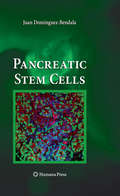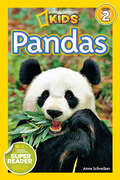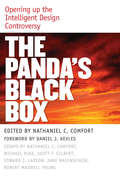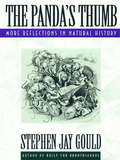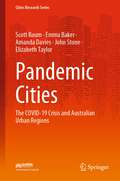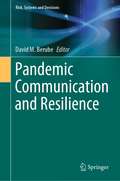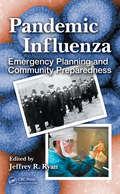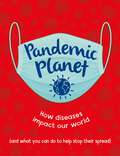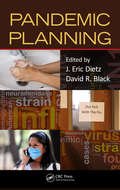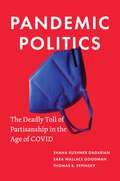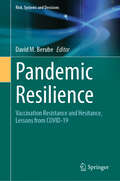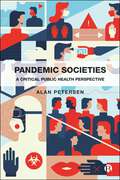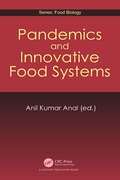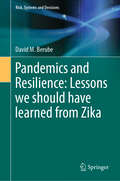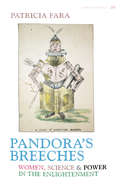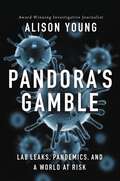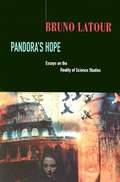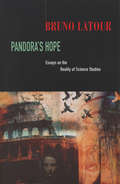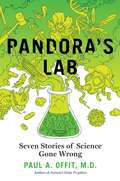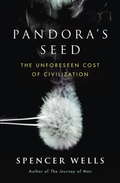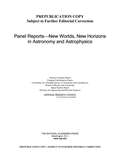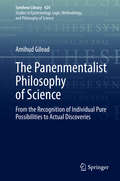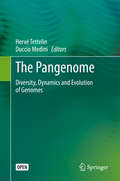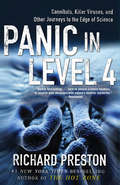- Table View
- List View
Pancreatic Stem Cells
by Juan Domínguez-BendalaFrom the discovery of Pdx1, the first "master gene" of pancreatic development, to the most recent findings on the role of microRNAs in beta cell homeostasis, the last fifteen years have seen an unprecedented advance in our understanding of the precise development and organization of the many different cell types that make up the pancreas. It is now widely acknowledged that the therapeutic differentiation of stem cells into pancreatic cells is an ambitious endeavor that will not succeed without a thorough understanding of the molecular processes underlying the native development of the organ. This book, aimed at experts and students alike, offers a comprehensive review of the state of the art in both pancreatic development and regeneration. The many strategies to differentiate adult and embryonic stem cells into pancreatic beta cells are also discussed in the context of potential therapeutic interventions for type I diabetes.
Pandas (Readers)
by Anne SchreiberThe whole world loves panda bears. Everyone loves to watch them play, climb, cuddle, and chew. But careful, they can scratch too—just look at that tree! Pandas live in wild places very far away, and they are the STAR ATTRACTIONS of every zoo that keeps them safe and well, all over the world.National Geographic supports K-12 educators with ELA Common Core Resources.Visit www.natgeoed.org/commoncore for more information.
The Panda's Black Box: Opening up the Intelligent Design Controversy
by Scott Gilbert Edward J. Larson Jane Maienschein Michael Ruse Robert M. YoungThe debate over Intelligent Design seemingly represents an extension of the fundamental conflict between creationists and evolutionists. ID proponents, drawing on texts such as Darwin's Black Box and Of Pandas and People, urge schools to "teach the controversy" in biology class alongside evolution. The scientific mainstream has reacted with fury, branding Intelligent Design as pseudoscience and its advocates as religious fanatics.But stridency misses the point, argues Nathaniel Comfort. In The Panda's Black Box, Comfort joins five other leading public intellectuals—including Daniel Kevles and Pulitzer Prize winner Edward Larson—to explain the roots of the controversy and explore the intellectual, social, and cultural factors that continue to shape it.One of the few books on the ID issue that moves beyond mere name-calling and finger-pointing, The Panda's Black Box challenges assumptions on each side of the debate and engages both the appeal and dangers of Intelligent Design. This lively collection will appeal to anyone seeking a deeper understanding of what's really at stake in the debate over evolution.
The Panda's Thumb: More Reflections in Natural History
by Stephen Jay GouldWere dinosaurs really dumber than lizards? Why, after ?all, are roughly the same number of men and women born into the world? What led the famous Dr. Down to his theory of mongolism, and its racist residue? What do the panda's magical "thumb" and the sea turtle's perilous migration tell us about imperfections that prove the evolutionary rule? The wonders and mysteries of evolutionary biology are elegantly explored in these and other essays by the celebrated natural history writer Stephen Jay Gould.<P><P> Winner of the National Book Award
Pandemic Cities: The COVID-19 Crisis and Australian Urban Regions (Cities Research Series)
by Scott Baum Emma Baker Amanda Davies John Stone Elizabeth TaylorThis book highlights the impact of the COVID-19 pandemic on cities. The COVID-19 pandemic and the associated economic and social impacts have been felt around the world. In large cities and other urban areas, the pandemic has highlighted a number of issues from pressures on urban labour and housing markets, shifts in demographic processes including migration and mobility, changes in urban travel patterns and pressures on contemporary planning and governance processes. Despite Australia’s relatively mild COVID exposure, Australian cities and large urban areas have not been immune to these issues. The economic shutdown of the country in the early stages of the pandemic, the sporadic border closures between states, the effective closure of international borders and the imposition of widespread public health orders that have required significant behavioural change across the population have all changed our cities in some and the way we live and work in them in some way. Some of the challenges have reflected long-standing problems including intrenched inequality in labour markets and housing markets, others such as the impact on commuting patterns and patterns of migration have emerged largely during the pandemic. This book, co-authored by experts in their field, outlines some of the major issues facing Australian cities and urban areas as a result of the pandemic and sets a course for future of the cities we live in.
Pandemic Communication and Resilience (Risk, Systems and Decisions)
by David M. BerubeThis book examines how we design and deliver health communication messages relating to outbreaks, epidemics, and pandemics. We have experienced major changes to how the public receives and searches for information about health crises over the last twelve decades with the ongoing shift from text/broadcast-based to digital messaging and social media. Both health theories and practices are examined as it applies to testing, tracking, hoarding, therapeutics, and vaccines with case studies. Challenges to communicate about health to diverse audiences (including the science illiterate) and across (both Western and developing economies) have been complicated by politics, norms and mores, personal heuristics, and biases, such as mortality salience, news avoidance, and quarantine fatigue. Issues of economic development and land use, trade and transportation, and even climate change have increased the exposure of human populations to infectious diseases making risk and resilience more pressing. The book has been designed to support health communicators and public health management professionals, students, and interested stakeholders and university libraries.
Pandemic Influenza: Emergency Planning and Community Preparedness
by Jeffrey R. RyanThe swine flu emergency needn‘t become a crisis. This critically acclaimed work provides public health officials, doctors, responders, and emergency planners with accurate current information that will help them understand the nature of an outbreak, assess risk, answer public concerns, and develop informed strategies. Devoid of sensationalism and a
A Pandemic Is Worldwide (Let's-Read-and-Find-Out Science 2)
by Sarah L. ThomsonRead and find out the science behind a pandemic and how to stay safe in this illustrated, informative nonfiction picture book. Everybody gets sick now and then—maybe with a runny nose or a sore throat. But sometimes, a lot of people get sick at once. If a disease spreads all over the world, that’s a pandemic. The current COVID-19 pandemic has upended the lives of kids across the world and has caused fear and confusion as people in charge have given conflicting orders. Read to discover the answers to some of your biggest questions, including:What is a pandemic? How are they created and spread? Has anything like this ever happened before? What is a coronavirus? What can we do to stay safe and healthy?While pandemics are rare, several have happened throughout the world’s history, such as the bubonic plague and smallpox, and our scientists have observed and learned some important lessons, such as the importance of vaccines.This Level 2 Let’s-Read-and-Find-Out shares important facts about past and current pandemics, taking readers from the origin of the word “quarantine” and through history’s many pandemics, to milestones such as the first vaccine that helped end smallpox.This book also comes with a handwashing diagram, a glossary, and a timeline of past pandemics and their impact on the world.This is a clear and appealing science book for early elementary age kids, both at home and in the classroom. It's a Level 2 Let's-Read-and-Find-Out, which means the book explores more challenging concepts for children in the primary grades. The 100+ titles in this leading nonfiction series are:hands-on and visualacclaimed and trustedgreat for classroomsTop 10 reasons to love LRFOs:Entertain and educate at the same timeHave appealing, child-centered topicsDevelopmentally appropriate for emerging readersFocused; answering questions instead of using survey approachEmploy engaging picture book quality illustrationsUse simple charts and graphics to improve visual literacy skillsFeature hands-on activities to engage young scientistsMeet national science education standardsWritten/illustrated by award-winning authors/illustrators & vetted by an expert in the fieldOver 130 titles in print, meeting a wide range of kids' scientific interestsBooks in this series support the Common Core Learning Standards, Next Generation Science Standards, and the Science, Technology, Engineering, and Math (STEM) standards. Let's-Read-and-Find-Out is the winner of the American Association for the Advancement of Science/Subaru Science Books & Films Prize for Outstanding Science Series.
Pandemic Planet: How diseases impact our world (and what you can do to help stop their spread)
by Anna ClaybournePandemic Planet gives young readers a clear, insightful, non-alarmist introduction to viruses and pandemics.Covid-19 has changed our world almost beyond recognition, but viruses and pandemics have always been with us. Pandemic Planet explores how we define pandemics, describes pandemics through the ages, from the Black Death to SARS, and assesses how we can arm ourselves against them, both at an individual and a global level.The matter-of-fact, clear and non-alarmist approach will reassure anxious readers. The book also looks at how we can learn from pandemics, as well as revealing some unexpectedly positive outcomes.Following on from Plastic Planet and Hot Planet, Pandemic Planet will feature the same blend of illustrations and photos and a striking cover, and is written by the award-winning science author Anna Claybourne.Aimed at readers aged 9 plusContents:1: Worldwide crisis2: What does 'pandemic' mean?3: Germs and diseases4: Pandemics of the past5: CASE STUDY: The Black Death 6: Immunity7: The early stages8: Out of control9: CASE STUDY: The 1918-19 flu pandemic10: Lockdown!11: Pandemic problems12: CASE STUDY: Covid-1913: Finding a solution14: Back to normal15: Preventing and preparing16: What can you do?17: Antibiotics alert!18: CASE STUDY: Antibiotic-resistant TB19: Pandemic planet?20: The positives21: Glossary22: Further reading23: Index
Pandemic Planning
by J. Eric Dietz David R. BlackPreparedness and rigorous planning on community, state, and regional levels are critical to containing the threat of pandemic illness. Steeped in research and recommendations from lessons learned, Pandemic Planning describes the processes necessary for the efficient and effective preparation, prevention, response, and recovery from a pandemic threa
Pandemic Politics: The Deadly Toll of Partisanship in the Age of COVID
by Shana Kushner Gadarian Sara Wallace Goodman Thomas B. PepinskyHow the politicization of the pandemic endangers our lives—and our democracyCOVID-19 has killed more people than any war or public health crisis in American history, but the scale and grim human toll of the pandemic were not inevitable. Pandemic Politics examines how Donald Trump politicized COVID-19, shedding new light on how his administration tied the pandemic to the president’s political fate in an election year and chose partisanship over public health, with disastrous consequences for all of us.Health is not an inherently polarizing issue, but the Trump administration’s partisan response to COVID-19 led ordinary citizens to prioritize what was good for their “team” rather than what was good for their country. Democrats, in turn, viewed the crisis as evidence of Trump’s indifference to public well-being. At a time when solidarity and bipartisan unity were sorely needed, Americans came to see the pandemic in partisan terms, adopting behaviors and attitudes that continue to divide us today. This book draws on a wealth of new data on public opinion to show how pandemic politics has touched all aspects of our lives—from the economy to race and immigration—and puts America’s COVID-19 response in global perspective.An in-depth account of a uniquely American tragedy, Pandemic Politics reveals how the politicization of the COVID-19 pandemic has profound and troubling implications for public health and the future of democracy itself.
Pandemic Resilience: Vaccination Resistance and Hesitance, Lessons from COVID-19 (Risk, Systems and Decisions)
by David M. BerubeThis edited volume draws from health communication scholars and offers a depthful examination of the roles vaccination have played and continue to play in contributing to human, community, and transnational protection against infectious diseases. The problems associated with vaccination against infection diseases was made abundantly clear during the current pandemic of COVID-19. Vaccines were traced back to Dr. Edward Jenner in the 18th century as a tool to control smallpox in England. Today we have six different categories of vaccines (three seem most controversial today): inactivated, live-attenuated, and messenger RNA (mRNA). We examine the reasons for public reluctance and outright resistance to vaccines examining cognitive biases, communication campaign failures, politicization, misinformation, partisanship, and greed. The healthcare industry has not treated all infected people equally, especially the poor and people of color. This is true in the USA as well as abroad. In the future, we can expect more exotic infections to increase due to globalization, development, and transportation. As climate changes, humans will contact more species carrying many different bacteria and viruses. Advances in medical research have led to increases in the number of vaccinations available to control infection and outbreaks. However, the rates of vaccination have fluctuated over time. A vaccine that is not used is meaningless. To increase vaccination rates, we must learn why the public shies away from vaccinations and under what circumstances. This information will enable us to design more effective messaging and communication campaigns to maximize general resilience. An interactive partnership between providers of healthcare and their patients is a prerequisite to productive and effective vaccination campaigns
Pandemic Societies: A Critical Public Health Perspective
by Alan PetersenFrom SARS to Zika, and Ebola to COVID-19, epidemics and pandemics have become increasingly prevalent in recent years. Each outbreak presents new challenges but the responses are often similar. This important book explores the dimensions, dynamics and implications of emerging pandemic societies. Drawing on ideas from sociology and science and technology studies, it sheds new light on how pandemics are socially produced and, in turn, shape societies in areas such as governance, work and recreation, science and technology, education, and family life. It offers pointers to the future of pandemic societies, including the expansion of technologies of surveillance and control, as well as the prospects of social renewal created by economic and social disruption.
Pandemics and Innovative Food Systems (Food Biology Series)
by Anil Kumar AnalThe debate on health, nutrition and food security could not have arisen at a more opportune time. The recent pandemic has given rise to increased food and nutrition insecurity for individuals, families, and communities. The crisis threatened the food security and nutrition of millions of people, many of whom were already suffering. We face possible disruptions to the functioning of food systems, with severe consequences for health and nutrition. Pandemics create a greater burden for poorer countries and countries since they are already pressure of inadequate food supplies. With concerted action, we can not only avoid some of the worst impacts but do so in a way that supports a transition to more sustainable food systems that are in better balance with nature and that support healthy diets – and thus better health prospects for all. This book aims to highlight the impact of pandemics in food systems and nutrition security. It draws on the experience from the past and present pandemics to better prepare the world for future crises.
Pandemics and Resilience: Lessons we should have learned from Zika (Risk, Systems and Decisions)
by David M. BerubeThe aim of the book was to produce the most comprehensive examination of a pandemic that has ever been attempted. By cataloging the full extent of the Zika pandemic, this book will be the most complete history and epistemic contextualization ever attempted to date. The work should function as the primary source for students, researchers, and scholars who need information about the Zika pandemic. This book examines the technical literature, digital and popular literature, and online materials to fully contextualize this event and provide a bona fide record of this event and its implications for the future. It is somewhat serendipitous that while this work was underway, we are going through another pandemic. One of the primary lessons we did not learn by Zika was pandemic events will return repeatedly, and we need to learn from each one of them to prepare the planet for the next one. Just because Zika seemed to have died out does not make it less important. We were lucky that the virus evolved into what seemed to be a less virulent version of itself, and the vector mosquitoes were concentrated elsewhere. Finally, this book represents a tour de force in scholarship involving nearly 4,000 sources of information and does not shy from a detailed examination of the controversies, conspiracies, and long-term consequences when we avoid learning from outbreaks, such as Zika.
Pandora's Breeches: Women, Science and Power in the Enlightenment
by Patricia Fara'Had God intended Women merely as a finer sort of cattle, he would not have made them reasonable.' Writing in 1673, Bathsua Makin was one of the first women to insist that girls should receive a scientific education. Despite the efforts of Makin and her successors, women were excluded from universities until the end of the nineteenth century, yet they found other ways to participate in scientific projects.Taking a fresh look at history, Pandora's Breeches investigates how women contributed to scientific progress. As well as collaborating in home-based research, women corresponded with internationally-renowned scholars, hired tutors, published their own books and translated and simplified important texts, such as Newton's book on gravity. They played essential roles in work frequently attributed solely to their husbands, fathers or friends.
Pandora's Gamble: Lab Leaks, Pandemics, and a World at Risk
by Alison YoungNamed to Kirkus Reviews&’ Best Books of 2023 A &‘remarkable book.&’ – The New York TimesThis fearless, deeply reported book about laboratory accidents asks the haunting question some elite scientists don&’t want the public to entertain: Did the COVID-19 pandemic start with a lab leak in Wuhan, China? This is an obvious question. Yet there&’s been an extraordinary effort by government officials in China, as well as leading scientific experts in the United States and around the world, to shut down any investigation or discussion of the lab leak theory. In private, however, some of the world&’s elite scientists have seen a lab accident as a very real and horrifying possibility. They know what the public doesn&’t. Lab accidents happen with shocking frequency. Even at the world&’s best-run labs. That&’s among the revelations from Alison Young, the award-winning investigative reporter who has spent nearly 15 years uncovering shocking safety breaches at prestigious U.S. laboratories for USA Today and other respected news outlets. In Pandora&’s Gamble, Young goes deep into the troubling history -- and enormous risks -- of leaks and accidents at scientific labs. She takes readers on a riveting journey around the world to some of the worst lab mishaps in history, including the largely unknown stories of the lab workers at the U.S. Army&’s Camp Detrick who suffered devastating infections at alarming rates during World War II. And her groundbreaking reporting exposes for the first time disturbing new details about recent accidents at prestigious laboratories – and the alarming gaps in government oversight that put all of us at risk. Sourced through meticulous reporting and exclusive interviews with key players including Dr. Anthony Fauci, former CDC Director Tom Frieden and others, Young&’s examination reveals that the only thing rare about lab accidents is the public rarely finds out about them. Because when accidents happen, powerful people and institutions often work hard to keep the information secret.
Pandora's Hope: Essays on the Reality of Science Studies
by Bruno LatourA scientist friend asked Bruno Latour point-blank: "Do you believe in reality?" Taken aback by this strange query, Latour offers his meticulous response in Pandora's Hope. It is a remarkable argument for understanding the reality of science in practical terms. In this book Latour, identified by Richard Rorty as the new "bête noire of the science worshipers," gives us his most philosophically informed book since Science in Action. Through case studies of scientists in the Amazon analyzing soil and in Pasteur's lab studying the fermentation of lactic acid, he shows us the myriad steps by which events in the material world are transformed into items of scientific knowledge. Through many examples in the world of technology, we see how the material and human worlds come together and are reciprocally transformed in this process. Why, Latour asks, did the idea of an independent reality, free of human interaction, emerge in the first place? His answer to this question, harking back to the debates between Might and Right narrated by Plato, points to the real stakes in the so-called science wars: the perplexed submission of ordinary people before the warring forces of claimants to the ultimate truth.
Pandora's Hope: Essays on the Reality of Science Studies
by Bruno LatourA scientist friend asked Bruno Latour point-blank: “Do you believe in reality?” Taken aback by this strange query, Latour offers his meticulous response in Pandora’s Hope. It is a remarkable argument for understanding the reality of science in practical terms. In this book, Latour, identified by Richard Rorty as the new “bête noire of the science worshipers,” gives us his most philosophically informed book since Science in Action. Through case studies of scientists in the Amazon analyzing soil and in Pasteur’s lab studying the fermentation of lactic acid, he shows us the myriad steps by which events in the material world are transformed into items of scientific knowledge. Through many examples in the world of technology, we see how the material and human worlds come together and are reciprocally transformed in this process. Why, Latour asks, did the idea of an independent reality, free of human interaction, emerge in the first place? His answer to this question, harking back to the debates between Might and Right narrated by Plato, points to the real stakes in the so-called science wars: the perplexed submission of ordinary people before the warring forces of claimants to the ultimate truth.
Pandora's Lab: Seven Stories of Science Gone Wrong
by Paul A Offit<p>What happens when ideas presented as science lead us in the wrong direction? <p>History is filled with brilliant ideas that gave rise to disaster, and this book explores the most fascinating--and significant--missteps: from opium's heyday as the pain reliever of choice to recognition of opioids as a major cause of death in the U.S.; from the rise of trans fats as the golden ingredient for tastier, cheaper food to the heart disease epidemic that followed; and from the cries to ban DDT for the sake of the environment to an epidemic-level rise in world malaria. <p>These are today's sins of science--as deplorable as mistaken past ideas about advocating racial purity or using lobotomies as a cure for mental illness. These unwitting errors add up to seven lessons both cautionary and profound, narrated by renowned author and speaker Paul A. Offit. Offit uses these lessons to investigate how we can separate good science from bad, using some of today's most controversial creations--e-cigarettes, GMOs, drug treatments for ADHD--as case studies. For every "Aha!" moment that should have been an "Oh no," this book is an engrossing account of how science has been misused disastrously--and how we can learn to use its power for good.</p>
Pandora's Seed: Why the Hunter-Gatherer Holds the Key to Our Survival
by Spencer WellsTen thousand years ago, our species made a radical shift in its way of life: We became farmers rather than hunter-gatherers. Although this decision propelled us into the modern world, renowned geneticist and anthropologist Spencer Wells demonstrates that such a dramatic change in lifestyle had a downside that we're only now beginning to recognize. Growing grain crops ultimately made humans more sedentary and unhealthy and made the planet more crowded. The expanding population and the need to apportion limited resources created hierarchies and inequalities. Freedom of movement was replaced by a pressure to work that is the forebear of the anxiety millions feel today. Spencer Wells offers a hopeful prescription for altering a life to which we were always ill-suited. Pandora's Seed is an eye-opening book for anyone fascinated by the past and concerned about the future.
Panel Reports--New Worlds, New Horizons in Astronomy and Astrophysics
by National Research Council of the National AcademiesEvery ten years the National Research Council releases a survey of astronomy and astrophysics outlining priorities for the coming decade. The most recent survey, titled New Worlds, New Horizons in Astronomy and Astrophysics, provides overall priorities and recommendations for the field as a whole based on a broad and comprehensive examination of scientific opportunities, infrastructure, and organization in a national and international context. Panel Reports--New Worlds, New Horizons in Astronomy and Astrophysics is a collection of reports, each of which addresses a key sub-area of the field, prepared by specialists in that subarea, and each of which played an important role in setting overall priorities for the field. The collection, published in a single volume, includes the reports of the following panels: Cosmology and Fundamental Physics Galaxies Across Cosmic Time The Galactic Neighborhood Stars and Stellar Evolution Planetary Systems and Star Formation Electromagnetic Observations from Space Optical and Infrared Astronomy from the Ground Particle Astrophysics and Gravitation Radio, Millimeter, and Submillimeter Astronomy from the Ground The Committee for a Decadal Survey of Astronomy and Astrophysics synthesized these reports in the preparation of its prioritized recommendations for the field as a whole. These reports provide additional depth and detail in each of their respective areas. Taken together, they form an essential companion volume to New Worlds, New Horizons: A Decadal Survey of Astronomy and Astrophysics. The book of panel reports will be useful to managers of programs of research in the field of astronomy and astrophysics, the Congressional committees with jurisdiction over the agencies supporting this research, the scientific community, and the public.
The Panenmentalist Philosophy of Science: From the Recognition of Individual Pure Possibilities to Actual Discoveries (Synthese Library #424)
by Amihud GileadThis book presents a philosophy of science, based on panenmentalism: an original modal metaphysics, which is realist about individual pure (non-actual) possibilities and rejects the notion of possible worlds. The book systematically constructs a new and novel way of understanding and explaining scientific progress, discoveries, and creativity. It demonstrates that a metaphysics of individual pure possibilities is indispensable for explaining and understanding mathematics and natural sciences. It examines the nature of individual pure possibilities, actualities, mind-dependent and mind-independent possibilities, as well as mathematical entities. It discusses in detail the singularity of each human being as a psychical possibility. It analyses striking scientific discoveries, and illustrates by means of examples of the usefulness and vitality of individual pure possibilities in the sciences.
The Pangenome: Diversity, Dynamics and Evolution of Genomes
by Hervé Tettelin Duccio MediniThis open access book offers the first comprehensive account of the pan-genome concept and its manifold implications. The realization that the genetic repertoire of a biological species always encompasses more than the genome of each individual is one of the earliest examples of big data in biology that opened biology to the unbounded. The study of genetic variation observed within a species challenges existing views and has profound consequences for our understanding of the fundamental mechanisms underpinning bacterial biology and evolution. The underlying rationale extends well beyond the initial prokaryotic focus to all kingdoms of life and evolves into similar concepts for metagenomes, phenomes and epigenomes. The book’s respective chapters address a range of topics, from the serendipitous emergence of the pan-genome concept and its impacts on the fields of microbiology, vaccinology and antimicrobial resistance, to the study of microbial communities, bioinformatic applications and mathematical models that tie in with complex systems and economic theory. Given its scope, the book will appeal to a broad readership interested in population dynamics, evolutionary biology and genomics.
Panic in Level 4: Cannibals, Killer Viruses, and Other Journeys to the Edge of Science
by Richard PrestonPanic in Level 4 is a grand tour through the eerie and unforgettable universe of Richard Preston, filled with incredible characters and mysteries that refuse to leave one's mind. Here are dramatic true stories from this acclaimed and award-winning author, including * the phenomenon of "self-cannibals," who suffer from a rare genetic condition caused by one wrong letter in their DNA that forces them to compulsively chew their own flesh--and why everyone may have a touch of this disease * the search for the unknown host of Ebola virus, an organism hidden somewhere in African rain forests, where the disease finds its way into the human species, causing outbreaks of unparalleled horror * the brilliant Russian brothers--"one mathematician divided between two bodies"--who built a supercomputer in their apartment from mail-order parts in an attempt to find hidden order in the number pi (π). In exhilarating detail, Preston portrays the frightening forces and constructive discoveries that are currently roiling and reordering our world, once again proving himself a master of the nonfiction narrative.
